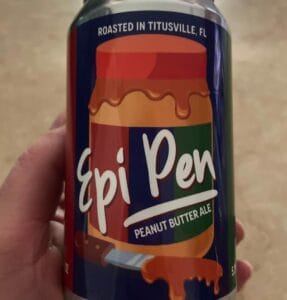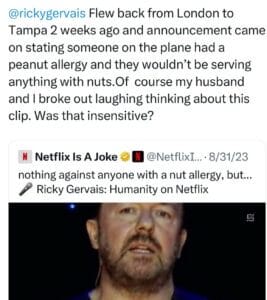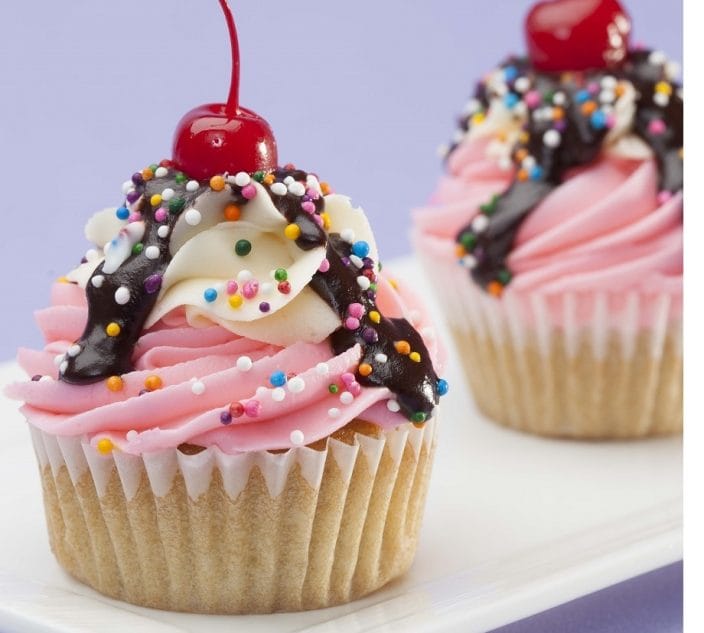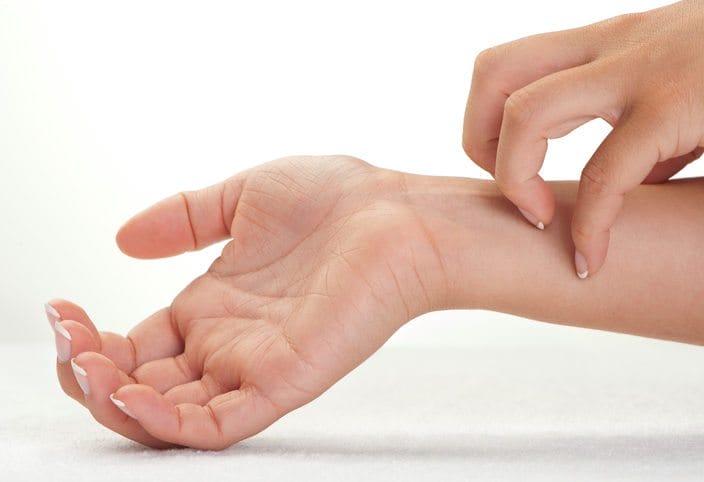Anyone who has seen someone they love, or even a stranger, in the throes of anaphylaxis will never forget it. Food allergy is a serious medical condition that can put you in the hospital or sometimes, even take a life.
You’d think that a condition that can leave a person struggling to breathe, losing blood pressure, covered in hives and vomiting repeatedly would deserve respect. But you’d be wrong. Food allergy gets precious little of that. Instead, over and over, it has become the subject of hilarity, the punchline.
For years this has happened on TV, in the movies, and now increasingly often, in our digital world to garner ‘likes’ and clicks. It’s even creeping into marketing. In this article, let me make the case: there are real-life consequences to humorously depicting food allergies.
This isn’t the first time I have said this on Allergic Living’s website. But I grow more concerned that food allergy “humor” shapes some people’s views and can lead to the downplaying of anaphylaxis. That can – and does – put those with food allergies in harm’s way.
Here’s a current example. On April 3, a student in Hamilton, Canada with a severe peanut allergy was slapped in the face by a hand covered in peanut butter. She had a reaction and used her auto-injector. She was taken from school to the hospital. Police have now charged a youth with assault. But where did he get the idea this is a “funny” prank?
Allergic Living has also covered the case of Carter Mannon, 16, a Texas football player with a severe peanut allergy. His school locker was contaminated by peanuts – by two of his own teammates. They videotaped the incident, thinking – it was hilarious. The perpetrators received the lightest of reprimands, while Carter faced backlash.
Food Allergy Humor: ‘Epi Pen Ale’
Let me turn to marketing and food allergy “humor”. On March 30, I saw a post from a Florida craft brewery advertising a “peanut butter beer week”. As the mom of a peanut-allergic teen going off to college next year, I didn’t love this. But I do understand the reality that the world will have peanut butter liquor and beers.

However, the Playalinda Brewing Company went a step beyond. It promoted several peanut butter beers, including one branded “Epi Pen Peanut Butter Ale”. That’s not just a trademark violation. Naming a beer ‘Epi Pen’ at best encourages food allergy humor. At worst, it encourages risky, even dangerous behavior.
Thomas Silvera, president of the Elijah-Alavi Foundation and father of a young child who died from food-induced anaphylaxis, commented on my Facebook post. “Calling a beer ‘Epi Pen’ … is absurd & insensitive,” he wrote. “In settings like college, this kind of humor harms more than it amuses, eroding empathy for those with life-threatening allergic conditions.”
After backlash and a legal letter from the makers of the EpiPen, the brewery halted production of the ale. But I’m with Thomas, this was harmful ‘humor’.
Making light of an EpiPen is also disturbing because far too many people think an epinephrine auto-injector is a magic wand, which always reverses a severe reaction. I have been told by flight attendants that because I carry ‘the Pen,’ they can serve peanuts around my son, with no issue. In reality, an auto-injector is more like a fire hydrant. And you don’t risk starting a fire – because the hydrant is nearby.
As the leading food allergy and airlines advocate, I collect testimonials about food allergy flight experiences on my website. One was submitted by an adult with a tree nut allergy. A flight attendant actually recommended she use her auto-injector before takeoff – because the flight crew would be serving tree nuts all around her.
Disrespect’s Reach: UberEats to Airlines
The so-called “Epi Pen Ale” is certainly not the first marketing effort to use food allergy for humor. It was only after an outpouring from the food allergy community that Uber Eats agreed to edit a 2024 Super Bowl ad that included an insensitive depiction of food allergies. If they hadn’t made their famous cut, a record 200 million viewers would have seen peanut allergy used for laughs.
Yet, not everyone feels contrite about employing food allergy humor. In May 2022, the Strange Donuts chain in Missouri thought it was amusing to post that their peanut-butter-laden hand pie was “your ticket off the planet” if you have a peanut allergy. Some angry allergy parents commented, to no avail, that the advertisement came two days after the news of a Nebraska teen’s peanut allergy death.

On digital platforms, the food allergy humor some weeks feels relentless. I particularly see many social media posts insulting airline passengers with food allergies.
A few weeks ago, on the X platform (formerly Twitter), a woman tagged comedian Ricky Gervais in a post. (Gervais is known for mocking those flying with peanut allergies.) The woman, a Tampa-based psychologist, wrote that she heard a PA announcement on a transcontinental flight that nuts wouldn’t be served because of a passenger with allergies. “Of course my husband and I broke out laughing thinking about this clip.” (She linked to a Gervais nut allergy comedy bit). “Was that insensitive?” she asked.
All I could think about was the fellow passengers who overheard the laughter in response to a reasonable accommodation request. One made for a real medical condition. This could lead to folks ignoring that announcement because they think food allergies are not worthy of respect. Again, there are consequences.
Bullies Use Food Allergy Humor
When jokes keep getting made, they seep into the public consciousness and encourage bullying. Remember football player Carter Mannon, mentioned earlier? When he opened his locker to get ready for a game, he picked up his cleats and jersey, and peanuts fell out. The two teammates responsible had asked, just the day before, if peanuts could kill him.
By brushing this off and giving slight punishment that included no suspension or demerits on the perpetrators’ records, the school helped to bolster the myth that food allergies are not serious. Again, no respect.
Luckily, Carter only reacted with hives from the contact. But this was a dangerous act against a teen with a severe allergy. After the incident, Carter faced harassment at school, and his family decided that a new school and a new home were the best options. Again, consequences.
When I shared Carter’s story, one of the comments on my Facebook post was from Nancy Swink. Her son Chandler died from anaphylaxis in 2014. He did not tell his friends that he was having a reaction, administered an auto-injector, and drove himself to the emergency room. He didn’t make it; he lost consciousness in the parking lot and later died.
Nancy has said her son faced bullying due to his peanut allergy. Did that contribute to him not drawing attention to himself by calling 911 or telling a friend about the reaction? I often wonder.
Making the Disrespect Unacceptable
The adage: “Sticks and stones may break my bones but words will never hurt me” does not apply to food allergies.
There is a dark side to food allergy humor. Society has become conditioned to laugh at food allergies, but words of jest can so easily turn into action. Those actions can and have caused real harm from hospitalization to fatalities. In a worst-case scenario, British teen Karan Cheema, who was severely allergic to dairy, lost his life in a bullying incident involving cheese exposure.
When kids or adults are embarrassed because of their food allergies, they may not inform those around them about their allergy and their epinephrine. Or they may just be silent about progressing anaphylaxis symptoms. Time is of the essence when treating an escalating reaction and this reticence to reveal can put a life at risk.
When food allergies are mocked, I’m often told: “it’s just humor.” No, it’s not. It’s misinformation that perpetuates attitudes that undermine the severity of food allergies, a growing public health concern.
In our community, let’s continue to correct the misinformation on food allergies and anaphylaxis. Let’s call out the “jokes” and make the public aware of their damage. In doing so, one fine day it will be unacceptable to make fun of a condition that can be fatal.
Lianne Mandelbaum is Allergic Living’s airlines correspondent, and the founder of NoNutTraveler.com. Article updated on April 10, 2024.
Related Reading:
The Trouble with Airline Meals and Food Allergies
Why Your Plane’s Medical Kit May Lack Epinephrine





